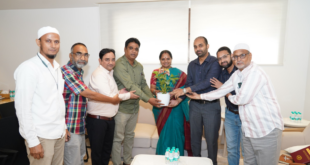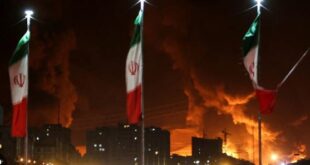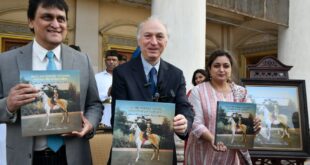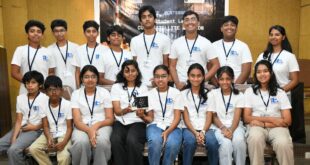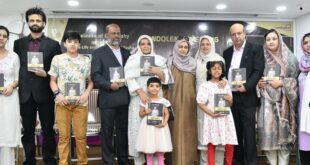By: Asad Mirza
Indian Prime Minister Narendra Modi will be in the US today, on his first visit to the US after becoming the country’s prime minister for the second time in may, this year and fourth since he became the prime minister for the first time in 2014.
As per the White House and Indian MEA’s sources, PM Modi will address a joint rally with President Trump in Houston, today (22 Sept.). This is for the first time in recent history that the leaders of the two largest democracies would be addressing a joint rally anywhere in the world
Ending speculation around whether he will make a joint appearance with Prime Minister Modi, U.S. President Donald Trump’s participation in the September 22 ‘Howdy, Modi!’ diaspora event in Houston has been confirmed. The U.S. President will also address the gathering – expected to be in the “tens of thousands” as per the White House Press Secretary.
“ It will be a great opportunity to emphasise the strong ties between the people of the United States and India, to reaffirm the strategic partnership between the world’s oldest and largest democracies, and to discuss ways to deepen their energy and trade relationship,” a statement from the White House Press Secretary said.
Over 50,000 people have registered for the event, which will be held at Houston’s NRG stadium. While the U.S. President has not attended one of Mr. Modi’s previous rallies in the U.S., his Wembley stadium rally in the U.K. in 2015 was attended by then-PM David Cameron, and Israeli PM Benjamin Netanyahu joined Mr. Modi for a similar event in Tel Aviv for people of Indian origin there.
Mr. Trump’s appearance at the rally will also be a strong personal signal in favour of Mr. Modi, as he faces concerns from a number of U.S. lawmakers over the situation in Jammu and Kashmir after the dilution of Article 370.
On September 13, after four senators wrote to President Trump calling for attention to the communication ban in parts of the state, seven Congressmen wrote another letter addressed to U.S. Ambassadors in Delhi and Islamabad asking them to “leverage their relationships” with the respective governments to ensure tensions are de-escalated, and the government releases those detained and restores communication.
The two countries are also attempting to resolve challenges in their trading relationship. With the U.S. Presidential elections looming in 2020, Mr Modi’s presence could also help Mr Trump with the Indian-American vote.
India’s Ambassador to the U.S., Harsh Vardhan Shringla said Mr. Trump’s participation reflects both the strength of the ties between the two countries as well as the personal chemistry between the Prime Minister and the President.
As expected, like previous tours, protests have also been planned for today in Houston. Some Sikhs and Kashmiri Muslims had organised a “dress rehearsal” protest in Houston on Saturday last (14 Sept.), The Houston Chronical reported. The Indian American Muslim Council, an advocacy group for Indian Muslims in the U.S., sent out an electronic notice and poster, asking people to join the Houston (and New York) protests against the government’s Article 370 action and subsequent restrictions in Kashmir, the NRC issue in Assam , as well as the treatment of minorities in India.
About 1,00,000 people have also signed an online petition demanding that U.S.-based Bill and Melinda Gates Foundation withdraw plans to award PM Modi for the Swachh Bharat Abhiyaan programme, during his visit to the U.S. between September 21-28.
An Indian delegation of political leaders and foreign policy experts will be visiting the United States ahead of Prime Minister Narendra Modi’s visit there to address the United National General Assembly (UNGA) on September 27. The delegation includes Congress leaders Manish Tewari and Jaiveer Shergill, BJP’s Rajiv Pratap Rudy and Shiv Sena’s Priyanka Chaturvedi.
The moot question is what is the reason that the Indian prime minister is in the US almost every year? One main reason could be that after the world becoming the unipolar world, it becomes essential for every country to maintain cordial relations with the US, whether be it for arms procurement or investment and trade.
Finding creative ways to enhance bilateral trade and increased market access including in agriculture (a particular U.S. concern) and information technology (of Indian interest), will be of main interest to both the countries.
In addition, as Modi and people around Modi have been fairly clear on their foreign policy, economic, and development vision. In speech after speech, a clear new ideology that we can call “Modism” or “Moditva” has emerged, a vision that seeks a strong and proactive role for India that includes being heard at international forums, reaching out to non-resident Indians, and courting investment. To reach these goals, a certain amount of marketing is necessary. Modi is a master at marketing and India is in dire need of marketing.
Marketing is important because it generates the conditions and circumstances that lead to actual policy triumphs. For example, for investment in India to increase, not only does India need to change its policies, but also it needs to convince foreign companies to invest in India. India has always been poorly marketed on the international arena by the Indian government in the past.
Despite its large size and demand for clout, it has frequently been ignored and not sought out on major international issues. Unlike Russian or Chinese leaders, its leaders have not acted like international statesmen in recent times. India developed an unfriendly reputation as a destination for international investment and is widely written off by foreign companies.
Domestically, India’s image has largely been shaped by the Western media, which tends to glorify or disparage its poverty. Media coverage of social problems, like caste and rape, have further hurt India’s image. In short, India has failed to portray itself as an attractive country in multiple realms. Of course, marketing alone won’t change this, but marketing goes hand in hand with policy improvements.
Finally what transpires between the two leaders will become clearer in a day or two, but what is clear is that both leaders want to take advantage of each other, for their domestic politics and audiences, and both are masters in this art of being verbose.
Asad Mirza is a Sr journalist based in New Delhi. In his career spanning more than 20 years, he was also associated with BBC Urdu Service and Khaleej Times of Dubai. He writes on Muslims, educational and international affairs issues. Email: asad.mirza.nd@gmail.com
 Gawah (The Witness) – Hyderabad India Fearless By Birth, Pristine by Choice – First National Urdu Weekly From South India – Latest News, Breaking News, Special Stories, Interviews, Islamic, World, India, National News
Gawah (The Witness) – Hyderabad India Fearless By Birth, Pristine by Choice – First National Urdu Weekly From South India – Latest News, Breaking News, Special Stories, Interviews, Islamic, World, India, National News

